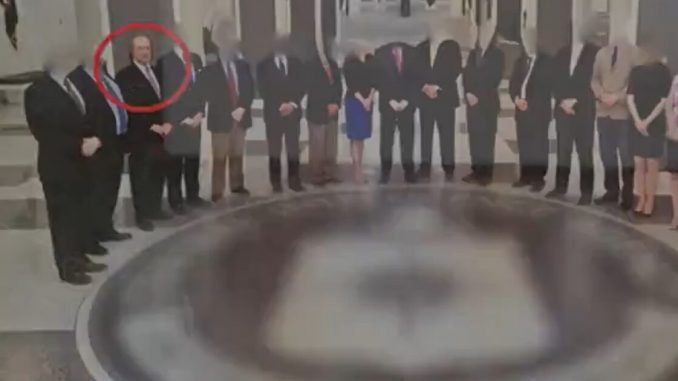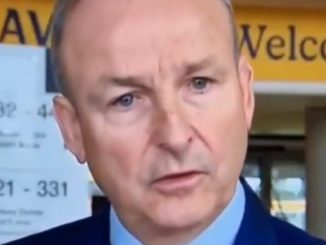
| Published August 28, 2025
A shocking report has surfaced claiming that America may soon witness the largest release of wealth in modern history. According to a government insider cited by Jim Rickards — a former CIA, Treasury, and Pentagon advisor — a $150 trillion “national endowment” could be set into motion as early as September 5, 2025.
Rickards, who has long warned about cracks in the global financial system, described the move as potentially “bigger than the Homestead Act of 1862” in terms of redistributing assets. He alleges the fund would have the capacity to buy every publicly traded company on the NASDAQ, every private home in the United States, and even all circulating Bitcoin — with trillions left over.
And thanks to Trump’s recent legislation, the first land sales could begin as early as September 1st.
Confusion Over Details
One of the most glaring issues with the report is the lack of consistency in the details. Some outlets echoing the story point to September 1, 2025, while others mention September 5 as the official launch date of the so-called wealth transfer. This kind of discrepancy raises immediate questions about the reliability of the information and whether the timeline is grounded in any concrete government plan.
Beyond the date confusion, the article fails to explain how such an enormous fund would actually be created or managed. The number being cited—$150 trillion—is nearly five times the annual GDP of the United States, making it hard to imagine how such a sum could suddenly be mobilized without triggering global economic chaos. There’s also no clarity on who would administer the program, how funds would be distributed to citizens, or whether it involves direct payments, asset purchases, or some form of government-backed investment scheme.
Another layer of uncertainty involves the legal authority behind such a sweeping action. Would Congress need to approve it, or could it be enacted through executive powers alone? The article does not address these constitutional or procedural hurdles, leaving readers with more questions than answers.
This vagueness opens the door to speculation, which is why critics dismiss the story as hype or conspiracy, while others see it as a deliberate attempt to keep Americans in the dark about a potential financial reset.
The Skepticism Factor
Skepticism is unavoidable when dealing with claims of this magnitude. The idea of a $150 trillion “national endowment” immediately raises red flags because it would be larger than the total combined wealth of the United States. Logistically, mobilizing such a sum without collapsing the currency system appears nearly impossible.
Another factor fueling doubt is the absence of independent verification. No official White House statements, Treasury Department releases, or credible financial news outlets have provided confirmation. The story also leaves out key details: Who would control such a fund? How would it be distributed? And under what legal authority could a program of this size even exist? Without answers, the claim remains more speculation than substance.
Still, skepticism itself has become a dividing line in America’s information war. Many argue that the mainstream press has lost credibility after years of downplaying or outright denying problems like inflation, border security, and the national debt — only to admit the truth when the damage was already done. From that perspective, quick dismissal of stories like this can be seen not as fact-checking, but as gatekeeping by a media establishment desperate to control the narrative.
In the end, whether the wealth transfer materializes or not, the bigger issue is trust. Americans are asking: Who do we believe — the political and financial elite, or the voices warning that something massive is about to change?
Bigger Than Dollars
At its core, this story isn’t just about money — it’s about power, control, and the future of the American Dream. A wealth transfer of this scale would reshape not only the economy but the very foundation of who owns what in this country. If the government can suddenly buy up homes, companies, or even cryptocurrencies, it raises a chilling question: what happens to individual freedom when wealth is no longer private but centralized under political authority?
This isn’t a debate over interest rates or tax policy. It’s a debate over sovereignty versus dependency. For generations, Americans built their lives on the promise of hard work, private property, and self-reliance. If those pillars are replaced by government handouts and nationalized ownership, the country risks trading liberty for security — and history shows that bargain rarely ends well.
It also highlights the growing divide between elites and everyday citizens. The financial class in Washington and Wall Street continues to insulate itself with bailouts, subsidies, and insider deals, while ordinary Americans face rising costs, mounting debt, and shrinking opportunities. A sudden “endowment,” even if well-intentioned, could entrench that divide further by making citizens more dependent on the very institutions that failed them.
In the end, the debate is bigger than dollars. It’s about whether America remains a nation of free individuals with control over their own property and future, or whether it drifts toward a managed system where power and prosperity are redistributed at the whim of those at the top.
 Implications
Implications
🔎 If the Wealth Transfer Were Real
-
Financial System Shock
-
Injecting $150 trillion suddenly into the U.S. economy would dwarf the GDP (~$28 trillion in 2025).
-
Could trigger hyperinflation, as prices skyrocket from oversupply of money.
-
-
Stock Market Disruption
-
If government funds “bought up” companies, NASDAQ and NYSE valuations would swing wildly.
-
Private ownership could collapse, as government-backed capital floods markets.
-
-
Housing Market Distortion
-
Buying “every private home in America” would remove individual ownership, essentially nationalizing property.
-
Mortgage markets and real estate finance would be obliterated.
-
-
Cryptocurrency Impact
-
Claiming the government could buy “every Bitcoin” would destroy the notion of decentralized, private digital currency.
-
Could either crash crypto (government control) or push investors to alternative assets.
-
-
Global Ripple Effects
-
Foreign markets would see the U.S. as unstable or predatory.
-
Dollar dominance could collapse as other nations flee to gold, commodities, or other currencies.
-
⚠️ If the Claim Is Not Real (Most Likely Scenario)
-
Mistrust & Confusion
-
Readers misled by such stories may distrust legitimate financial news.
-
Creates “doomsday” anticipation that undermines confidence in markets.
-
-
Political Exploitation
-
Can be weaponized to frame one administration as revolutionary or another as suppressive.
-
Adds fuel to conspiracy theories about “hidden wealth” and government manipulation.
-
-
Investor Behavior
-
People who believe this may move money into gold, crypto, or other “safe havens,” unintentionally creating market volatility.
-
-
Media Landscape
-
Repeated unverified claims from fringe outlets further polarize the media ecosystem.
-
 Overall Takeaway:
Overall Takeaway:
Whether or not this “massive wealth transfer” materializes, one thing is clear: Americans are hungry for change. Decades of reckless spending, globalist trade deals, and bureaucratic mismanagement have left middle-class families struggling while elites and foreign powers profit. Talk of a $150 trillion “endowment” shows just how desperate people are for bold solutions that actually put American citizens first.
The political establishment and mainstream media will no doubt dismiss such claims as “conspiracy theories” — but that knee-jerk reaction is exactly why so many voters don’t trust them anymore. They laughed at warnings about inflation, denied the damage of open borders, and ridiculed the idea that Washington insiders were enriching themselves at the expense of taxpayers. Yet here we are, with record debt, higher costs for everything, and an economy rigged for the few, not the many.
If nothing else, the Gateway Pundit story reminds us that the fight isn’t just about dollars — it’s about who controls the future of this country. Will it be unelected bureaucrats and Wall Street oligarchs, or will it be hardworking Americans who demand accountability and sovereignty? The answer will define not only our economy, but the very survival of the American Dream.




Be the first to comment